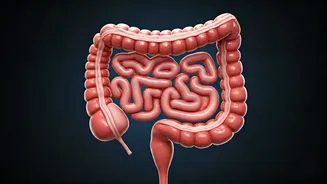Alarming Rise Noted
Recent data has shown a concerning increase in colorectal cancer diagnoses among young adults. This trend, particularly noticeable in the United States,
prompts serious questions about the causes and preventative measures that can be taken. The disease, once primarily associated with older demographics, is now affecting a younger population. This shift necessitates a reevaluation of lifestyle factors, especially diet, which play a significant role in cancer development. Identifying and understanding these risks are vital steps in protecting oneself and loved ones. The increase demands greater awareness and a focus on preventative strategies tailored to the younger generation.
Dietary Culprits Uncovered
A Los Angeles-based surgeon specializing in the field has pointed out several dietary elements that may contribute to the rise of colorectal cancer. It's crucial to acknowledge the link between diet and this specific type of cancer. According to the expert, certain foods and beverages should be avoided or significantly reduced in consumption. These dietary culprits are often staples in many diets, implying the need for a thoughtful evaluation of eating habits and their long-term health implications. Changing one's food choices can be a great step toward reducing risks.
Food and Drink Choices
The surgeon has provided a list of specific foods and drinks to avoid or limit. These include processed meats, a category that often includes items like bacon, sausages, and deli meats, known for their high levels of preservatives and additives. Excessive alcohol consumption is another area of concern, as it has been linked to increased cancer risk. Sugary drinks, like sodas and sweetened beverages, are also on the list. High-fat foods, particularly those prepared with unhealthy cooking methods, may increase risk. Finally, red meat, consumed in high amounts, has also been implicated in increasing colorectal cancer risk, highlighting the importance of balancing food choices. The information shared is aimed at helping people change their behavior.
Taking Preventative Steps
To address the increasing risk of colorectal cancer in young adults, taking preventative steps is vital. Starting with the avoidance or limiting the consumption of the foods and drinks as noted by the surgeon is a great initial step. Another key is to incorporate more fiber-rich foods into the diet, such as fruits, vegetables, and whole grains. Regular exercise and maintaining a healthy weight are also critical components of a preventive approach. It is also important to stay hydrated. Consulting a healthcare professional for personalized advice and screening recommendations can help provide additional measures to protect one's health, offering the best defense against this rising threat.





















